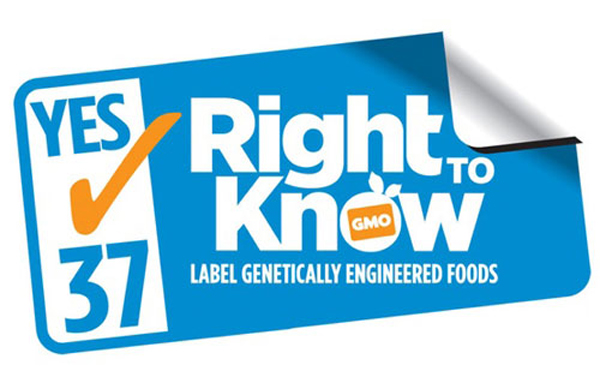Surely you’ve been hearing the buzz about GMOs by now. As the vote in California is just around the corner, many more groups are talking about this controversial topic. In case you aren’t sure what all the talk is about, the California ballot next month will ask voters to pass a law to require labeling of GMOs, or Genetically Modified Organisms. If you haven’t decided where you stand about this subject, here are 7 facts about GMOs we hope will persuade you to vote Yes on 37.
1. A GMO is a Food with Altered DNA. Before we get too caught up in the details, let’s start at the beginning and define what a GMO is. GMO stands for Genetically Modified Organism. Much of our food supply is comprised of these organisms. A genetically modified food is a plant or meat that has had its DNA altered in a lab. Genes from other plants or organisms have been artificially altered to create unnatural compounds in food. This is all done in order to yield larger crops, allow the crop to resist insects, protect against viruses, and tolerate herbicides. This is all done in hopes to create bigger profits and lower costs to consumers.
2. The US is a Global Leader in GMO Crops. According to USA Today, the US leads the world in GMO crop planting. We planted 170 million acres in 2026. That yielded 95% of the country’s sugar beets, 94% of the soybeans, 90% of the cotton, and 88% of the feed corn.
3. GMOs are Standard in Processed Foods. The majority of GMOs that become supermarket foods are found in processed foods. Things like crackers, cereal, or frozen meals are all common sources of GMOs. Up to 70 percent or more of the processed foods in grocery stores contain ingredients that are GMOs.
4. 61 Countries Require GMO Labels, but Not the US. The US does not have labels indicating which products contain GMOs. However, 61 other countries across the globe do have such requirements. Australia, Brazil, China, Russia, Japan, Spain, and the UK are just a few of the many countries that label their GMO products. Yet, the US is one of the few developed nations that does not give that information to the consumers.
5. More than $34 Million Spent on No on 37 by Leading Health Food Brands. The state of California has the issue of labeling GMOs on their ballot this November. Interestingly, many companies are paying big money to campaign against labeling. Monsanto is against labels, as they are one of the biggest biotech companies in the world. They are leading seemingly health conscious companies like Kashi, Silk, and Horizon Organics in spending $34,440,286 in anti-labeling campaigning.
6. GMO Ingredients Linked to Allergens. Foods comprised of GMO ingredients or meats and dairy that have been fed GMO feed have been linked to an increase in allergens and immune system compromises, especially in children. These facts have been gathered by independent studies, as the government does not require testing on these products. While they insist GMOs are safe, there’s no long-term evidence to back up those claims.
7. This Summer’s Sweet Corn was First Produce to be GMO. Before this summer, there were no commercial GMO produce items in our stores, consumers only had to be concerned about GMOs in the processed food. However, this summer Monsanto’s sweet corn became the first commercially distributed genetically modified produce to be sold to the public. It was placed in the produce bins with no label and no way for consumers to know what they were eating.
There are pages and pages of things to know about GMOs. Hopefully these 7 facts can start clearing up your first questions and enable you to know what’s going on with the food you buy in your stores. We encourage you to make an educated vote next month, and for the sake of all of our health, vote yes on 37.
Also Read:
The GMO Trick in Halloween Treats

